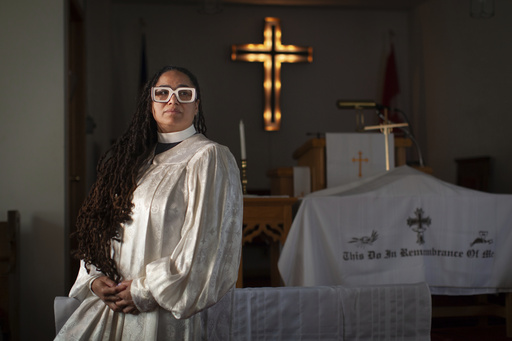When the African Methodist Episcopal Church, the largest independent Black Protestant denomination globally, convened its General Conference in Ohio this past August, a pressing issue on the agenda was same-sex marriage. The Rev. Jennifer S. Leath, who has been advocating for this cause for 20 years, found herself at the center of this debate. Identifying as “quare,” which reflects both her same-sex attraction and her academic background as a “blackqueer womanist” thinker, Leath was just 23 when, in 2004, the church took a controversial vote prohibiting participation in same-sex marriages or unions, which was largely seen as a reaction to the Episcopal Church’s decision to elect the first openly gay bishop, Rev. V. Gene Robinson.
Since that time, marriage equality has gained widespread recognition across the United States. Leath is now engaged in a struggle within her denomination regarding whether it should change its policy on same-sex marriage. She finds herself mediating two contrasting viewpoints: one faction desires an acceptance of same-sex marriage, while the opposing faction recently quashed a proposal that would have allowed for open discussions on the topic. The decision effectively nullified three years of work conducted by the Sexual Ethics Discernment Committee, launched in 2021 to explore the church’s direction on sexual ethics.
Despite feeling “disappointed and frustrated” by the recent conference’s outcome, Leath is determined to stay and fight for change. According to her, the church’s current stance has contributed to a sense of alienation for many LGBTQ+ members. “LGBTQ+ individuals within the church endure silent suffering while others are forced to seek or create new spiritual communities,” she stated.
In the AME church, interviews with various clergy and lay leaders reveal a generational divide. Older members often view LGBTQ+ relationships as sinful, maintaining traditional beliefs about marriage. Conversely, Leath recognizes a younger contingent that embraces sexual diversity, affirming that everyone is created in the image of God. “There is a pressing urgency for young individuals feeling trapped by their circumstances, as they contemplate extreme solutions or leaving the church altogether,” she said, emphasizing the weight of this situation on her ministry.
Leath’s background as a well-educated Ivy League graduate and her lineage, being the daughter of a prominent AME bishop, adds a layer of influence to her advocacy for LGBTQ+ inclusion in the church. She is committed to steering her denomination away from the divides that have splintered numerous mainline Protestant denominations in the country. While groups such as Presbyterians and Methodists have begun to lift restrictions on same-sex marriage, many of their congregations have splintered into more conservative splinter groups.
“To me, the AME church represents a space where diverse views can coexist while we strive for justice for everyone,” she explained. “However, this is only sustainable as long as we collectively recognize and uplift those who are marginalized, adjusting our faith practices accordingly.”
From a young age, Leath felt a calling toward Christian service, growing up in the historical Mother Bethel AME in Philadelphia, where her father ministered for 14 years. “Her father has always stood firm in his beliefs, even when faced with opposition,” noted Rev. Reginald Blount, an AME pastor and associate professor. He believes Leath embodies similar traits, demonstrating the courage to advocate for what she believes is right.
However, her parents’ initial response to her sexuality was harsh, having discovered it through her diary. Following a transformative experience during an altar call, Leath attended the Youth Theology Institute at Emory University. It was there that her desire to preach was affirmed, and she connected with other LGBTQ+ Christians also seeking to reconcile their faith and identity. This stood in stark contrast to the homophobic challenges she faced in traditional AME settings. A note from that formative summer still hangs in her childhood bedroom, reading, “Jen, we see God in you.”
While participating in the Youth Theology Institute, she met Blount, who recognized her potential in ministry given her family’s AME tradition. After graduating high school, she attended Harvard, earning her degree in Social Studies and African American Studies with honors in 2003. Not long after, the AME church voted to impose penalties on clergy who performed or officiated same-sex unions, declaring such unions contrary to God’s will.
By the time Leath enrolled at Union Theological Seminary in New York, where she earned her Master of Divinity in 2007 and later her Ph.D. from Yale, her father had become the AME church’s 128th bishop. Following her parents’ path, she achieved her first pastoral appointment in 2012, serving churches in Pennsylvania, New York, and Colorado.
In 2015, she began teaching at Iliff School of Theology in Denver. It was the same year that Obergefell v. Hodges legalized same-sex marriage nationwide. In the pages of the Christian Recorder in 2017, she asserted that the church’s policies regarding sexual orientation were outdated and detrimental. She emphasized the lack of consensus within the AME regarding these issues and stressed the sacredness of all identities, asserting that people outside traditional norms would neither hide nor disengage from the church.
The AME church is set to meet again in 2028, with the Sexual Ethics Discernment Committee expected to reconvene before then. Leath holds hope that progressive changes will emerge, leading to the removal of discriminatory language from the church’s doctrine. “Future generations will demand a stronger and clearer affirmation of our diverse identities,” she predicted.
Currently, Leath faces challenges typical of LGBTQ+ clergy within her churches. For instance, after some parishioners discovered her sexual orientation in her current congregation in Windsor, Ontario, a number chose to leave. Despite this rejection, she commutes four hours from Toronto to serve her congregation and continues to teach on topics such as “Queering Religion” at Queen’s University in Ontario. “This journey reflects my commitment to unconditional love for God, the church, all creation, and myself,” she declared.
